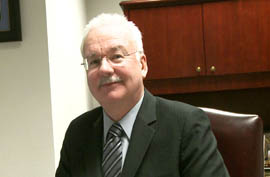Cronkite News has moved to a new home at cronkitenews.azpbs.org. Use this site to search archives from 2011 to May 2015. You can search the new site for current stories.
Plan to keep lottery winners’ names secret fails in Senate
PHOENIX – A bill that would keep the names of Arizona Lottery winners secret failed to win state Senate approval Thursday but will get another vote.
The Senate voted 16-11 against HB 2082, authored by Rep. John Kavanagh, R-Fountain Hills.
While Kavanagh said the bill would protect lottery winners from criminals and scam artists, freedom of information advocates said the change would hurt the public’s ability to monitor a government-run enterprise.
Kavanagh said in a telephone interview that his bill failed because he didn’t speak with Senate members prior to the vote.
“I feel that I dropped the ball,” he said. “I didn’t realize it was up for a vote today, so I didn’t prep the members.”
However, Sen. Rich Crandall, R-Mesa, successfully moved to allow the bill another floor vote at a later date.
HB 2082 passed the House with little opposition.
Kavanagh said he offered the bill after Fountain Hill resident Matthew Good shared November’s $587.5 million Powerball jackpot. Good wished to remain anonymous, but his information was released in response to a public records request.
Five states have laws allowing lottery winners to remain anonymous.
The Arizona Lottery allows winners to request anonymity but must releases names, hometowns and amounts upon request.
Explaining his vote in favor of Kavanagh’s bill, Sen. Al Melvin, R-Tucson, said he supports protecting those who are fortunate enough to win the lottery.
“It just seems like the right thing to do to keep an individual citizen from having their life go through a nightmare because they won,” he said.
David Bodney, a media attorney and partner with the Phoenix law firm Steptoe & Johnson, said Kavanagh’s bill would make it impossible for the public to monitor how lottery money is used and to whom it goes.
“When it comes to overseeing potentially hundreds of millions of dollars and their distribution, the public has a right to know that the system is operating fairly, honestly and without a hint of public corruption,” he said in a telephone interview. “The Senate recognized that Arizona cannot afford to operate a lottery without ensuring transparency and openness.”
Bodney said lottery players have the option of gambling in other ways that allow them to remain anonymous.
“If they want to participate in a public lottery and enjoy the winnings that come through the state of Arizona, it’s a small price to pay in exchange for those winnings,” he said.
Kavanagh said he’s optimistic about his bill’s chances of passing the Senate on reconsideration.
“I had a chance to brief House members and have it pass with bipartisan support,” he said. “I’m confident I’ll have a chance to talk to the senators and show them the need for this.”







